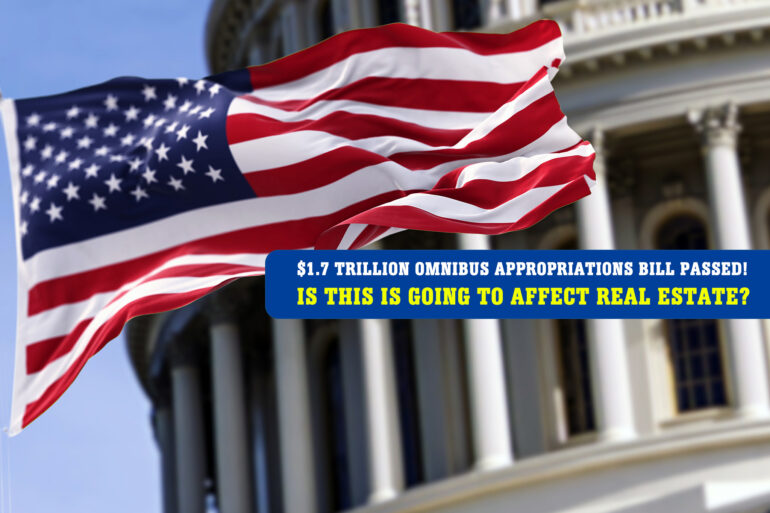10 Ways the Recent U.S. Appropriations Bill Could Impact Your 2023 Real Estate Investing Strategy
On December 29, 2022, Congress passed a $1.7 trillion Omnibus Appropriations bill, which contains funding for many programs that could impact experienced and aspiring real estate investors.
This could give savvy investors a head start in knowing where to buy next.
If you’re wondering, an appropriation bill is a bill that Congress passes every year to determine how federal funds will be used during the upcoming fiscal year, which runs from October 1 through September 30 the following year (in this case, October 1, 2022, through September 30, 2023).
Though this year’s appropriation bill continues funding for many of the same programs that it did last year, there are some notable funding initiatives that focus on real estate. Here are the top 10 that you should be aware of:
1. Community Development Block Grants (CDBG)
The appropriation bill includes $6.39 billion in funding for the Community Development Block Grant (CDBG) program (and related local economic and community development projects), which provides grants to states, cities, and counties to develop affordable housing for low- and moderate-income people. This is a $1.55 billion increase in CDBG funding from last year.
What does this mean for investors? There may be an increase in the supply of multi-family properties and small single-family properties in areas whose governments apply for funding. This could give savvy investors a head start in knowing where to buy next.
2. Community Development Financial Institutions (CDFI) Fund
$324 million has been appropriated to the Community Development Financial Institutions (CDFI) Fund, which promotes economic and community development in low-income communities, including investments in low-income housing.
This is another opportunity for investors to focus on low-income multi-family housing.
3. Flood Insurance
The National Flood Insurance Program (NFIP), which was set to expire on December 23, 2022, has been extended through Sep 30, 2023.
This may impact the number of Florida homeowners that can recover from recent natural disasters like Hurricane Ian, which caused the NFIP to incur an estimated $10 billion in losses. As a real estate investor, this is important to know because it could impact the local real estate market in several ways: the number of foreclosures, housing demand, housing supply, and the availability and price of flood insurance.
4. Elderly Housing Assistance
The bill appropriates $1.435 billion toward Housing for the Elderly and Housing for Persons with Disabilities programs, of which $258 million will support new awards of capital advance and rental assistance opportunities to serve an estimated 2,910 additional households.
For real estate investors interested in serving the elderly and disabled, this funding can help guarantee rental income from tenants who might otherwise struggle to make their payments.
5. HOME Investment Partnerships Program
$1.5 billion has been awarded to the HOME Investment Partnerships Program, which will lead to the construction of nearly 10,000 new rental and homebuyer units. The program helps fund the building, buying, and rehabilitating of affordable housing for low-income families.
This may provide a new supply of multi-family properties to invest in.
Since most Section 8 units have long waiting lists, vacancy rates tend to be low, and this new round of funding will help push them even lower.
6. Housing Choice Vouchers
The bill awards $130 million in new incremental funding for Section 8 Housing Choice Vouchers. This will be enough to support an additional 11,700 low-income households.
Investing in Section 8 properties has its pros and cons, but one of the major benefits is the guaranteed monthly rental income. The government pays up to 70% of your Section 8 tenants’ rent. And since most Section 8 units have long waiting lists, vacancy rates tend to be low, and this new round of funding will help push them even lower.
7. Housing Supply
$85 million in grants are being awarded to state and local jurisdictions that reform land-use policies to remove barriers to producing and preserving affordable housing. This will encourage state, local, and regional governments to increase zoning density, reduce minimum lot sizes, create transit-oriented development zones, streamline the permitting process, and permit various housing types.
Creative real estate investors may use this as an opportunity to invest in more alternative types of housing like accessory dwelling units (ADUs), duplexes, and other multi-family properties.
If you want to get in on some of the recent growth in this niche real estate market, now’s a great time.
8. Manufactured Housing
$225 million is being put toward preserving and revitalizing manufactured housing and manufactured housing communities (aka mobile home parks).
This follows a growing trend of manufactured housing becoming more popular. Now that the housing supply is down, average household size is shrinking, and many baby boomers are looking to downsize, manufactured home sales have been going up and so have their prices. If you want to get in on some of the recent growth in this niche real estate market, now’s a great time.
9. Rural Housing
The bill appropriates $2 billion to the Rural Housing Service under the U.S. Department of Agriculture (USDA). This is an increase of $183 million from last year.
Rural housing is an often overlooked but potentially lucrative investment opportunity, and this new funding may make it even more attractive. The Rural Housing Service offers loans, grants, and loan guarantees for single, multifamily, and other properties.
For example, new investors may be eligible to get a USDA loan for 0% down so long as they live in one of the property’s units (aka house hacking). Of course, properties must also be located in rural areas. However, if you look at the USDA loan eligibility map, you’ll see that most areas outside big cities qualify.
10. Small Business Programs
Lastly, over $2 billion will go toward funding the Small Business Administration (SBA), including its SBA disaster loans, Entrepreneurial Development grants, and Small Business Development Centers.
Though not exclusively focused on real estate, the SBA offers many services and resources that can help your real estate business. For example, they offer business loans, help with business planning, and disaster assistance to help businesses and homeowners recover from natural disasters.
So, if you’ve set up a limited liability company (LLC) for your real estate business, the SBA (and its new funding) can be a great source of help.
One of these newly funded programs may be just what you need to take your real estate business to the next level!
Adding It All Up
Whether you’re a beginner real estate investor or a seasoned pro, let the recent appropriations bill help shape your investing strategy for the new year. One of these newly funded programs may be just what you need to take your real estate business to the next level!
And if you’re interested in investing in the Florida real estate market, check out our free property search map. It can help you find bargain deals on foreclosure and tax deed properties that aren’t listed publicly.








